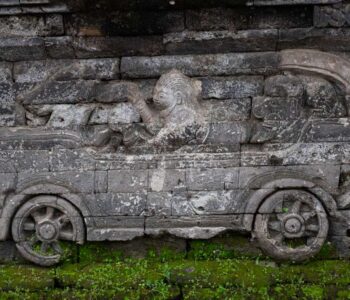The Puputan Badung: Artist Marmar Herayukti Reimagines a Heroes Monument
Multidisciplinary Balinese artist, Marmar Herayukti, recently revealed his latest artistic work with the unveiling of ‘The Puputan Badung’ diorama in Denpasar. This new display has reimagined an existing iconic statue, Monumen Puputan Badung, made in remembrance of one of Bali’s most significant historical moments. Bali’s ‘puputan’, or mass ritual suicides, committed during Bali’s war against

Unique Celebrations: Bali’s One-of-a-Kind Festivals
There is a concept in Bali called ‘Desa Kala Patra’, which translates to ‘place’, ‘time’ and ‘situation’. It is a philosophy that encourages tolerance to the differences around the island, be it between regions or even neighbouring villages. The idea is that a people or place are shaped by their different circumstances, histories, geographies, and

A Historical Look at the Musical Instruments of Bali and Java
Traditional music in Indonesia reflects the country’s multicultural heritage, drawing influences from Hindu, Buddhist, Islamic, and indigenous traditions. The archipelago is home to many musical styles and instruments. Music here is not just entertainment, but a rhythm that courses through daily life, festivals, politics and spiritual rituals. From ancient courts to bustling markets, music unites

Behind The Apurva Kempinski Bali’s Majapahit-Inspired Architectural Masterpiece
Taking a distinctive approach to honouring Indonesia’s ancient heritage, The Apurva Kempinski Bali in Nusa Dua presents a majestic display that mirrors the might and grace of the Majapahit Empire, a defining era in the nation’s cultural identity. Tasked with capturing the grandeur of this period, architect Budiman Hendropurnomo of Denton Corker Marshall and interior

Through Her Eyes: A Month of Art and Empowerment at COMO Uma Ubud
Delve into a month-long celebration of art, storytelling, and empowerment as COMO Uma Ubud launches a new edition of its immersive cultural programme – COMO Journey: Through Her Eyes – a 31-day exploration of creativity, feminine power, and self-expression, anchored in the serene surroundings of Ubud. The signature COMO Journey: Through Her Eyes event invites

Weaving Balinese Art and Culture Into Bali’s Most Iconic Hotels and Resorts
To many visitors, exploring the island’s rich culture typically means a trip to galleries and museums, where art, tradition, and history are on full display. But why should this experience be limited to these spaces when across the island, hotels and resorts have found their own ways to incorporate Bali’s artistry into their properties? Whether

Asta Kosala Kosali: Ordering Space, Mirroring the Cosmos
Asta Kosala-Kosali is the traditional Balinese system of spatial and architectural rules that governs how buildings and compounds are planned, oriented, and proportioned. Though its details vary from village to village, the system provides a coherent grammar for organizing the environment—defining not only where structures stand, but how they are approached, used, and understood. Tripartite

A Meeting of Design Cultures
What happens when international designers are given an opportunity to meet and be inspired by Bali’s traditional crafts and artisans? Since 2022, CushCush Gallery have been facilitating this exact creative cultural exchange, with some fabulous results. Two curious stools stand in the corner of a showroom. Covered entirely with tightly-wrapped fibres, attached to the top

‘Is Bali Hindu?’ Part Two: A Collective Identity
The Balinese only began to take steps to define their collective identity (Kebalian) in Singaraja, North Bali during the first decades of the 20th century. The indirect catalyst of this phenomenon was the incorporation of North Bali into the Netherlands East Indies after a series of violent confrontations that took place between 1846 and 1849. Although

Bungkak Nyuh Gading: A Vessel of Purity in Balinese Rituals
Coconuts are ubiquitous across Bali, not just as part of the island’s landscapes, but also in everyday life. Known as the ‘Fruit of Life’, the coconut is cherished for its nourishment and versatility, enjoyed as a drink, or shredded and milked into local dishes; but the coconut also plays an important role in Balinese ceremonies.

Indonesian Fruits Through the Eyes of Early Explorers and Botanists
Indonesia is known for its vibrant markets which boast a rich variety of fruits, or ‘buah’. From luscious mangosteens to spiky durian, fruits play an important part in Indonesian cuisine. While Indonesians have cherished these delights for centuries, it was the first European explorers and botanists who introduced these exotic fruits to the rest of

A Guide to Bali’s Architectural Elements
Bali has a strong visual language, seen across the island through its vernacular architecture and iconography found in temple complexes, traditional homes and other heritage-inspired buildings. Here are some of the most recognisable architectural elements that together build the cohesive aesthetic identity of Bali. Candi Bentar The towering split gateway that marks the entrance to

Bali 1952: Through the Lens of Liu Kang
A recently published photography book chronicles the 1952 sketching adventure to Java and Bali by four artists – Chen Wen Hsi, Chen Chong Swee, Cheong Soo Pieng and Liu Kang. Written by Gretchen Liu and published by the National Library Singapore, Bali 1952: Through the Lens if Liu Kang adds a unique visual window into




